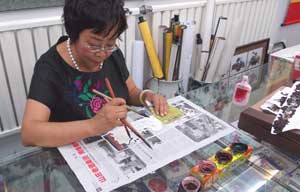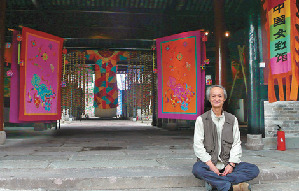Flower grannies keep a fragrant tradition alive
Updated: 2013-08-13 14:04
By Wu Ni in Shanghai (China Daily)
|
|||||||||||
The ylang-ylang is widely planted in the southern Yangtze River region, he says. In Suzhou of Jiangsu province, young women used to wrap the flowers in their handkerchief and put it inside their clothes, creating an effect known as "you can't see the flowers but you can smell the scent".
In the 1920s, carriages ran between Jiangsu and Shanghai to transport newly picked flowers to the city in large quantities, Xue says.
"Perfume was a luxury at that time in Shanghai and the flowers could cover the smell of sweat. So the popularity increased and there were many women selling flowers," he says.
The tradition continues today.
Each year from May until the end of October, when the ylang-ylang blooms, it is a common sight to see older women peddling bamboo baskets filled with scented flowers on the streets of Shanghai.
Yang is just one of them. She is almost stubborn with the price: 3 yuan (49 US cents) for a pair of ylang-ylang and 5 yuan for a jasmine bracelet. "Those who really like wearing the flowers won't bargain," she says.
Yang could earn up to about 2,000 yuan a month, modestly above the city's minimum wage of 1,620 yuan. After retiring as a street cleaner of the city's sanitation bureau, Yang's pension has risen to 3,300 yuan per month.
She has four children who could support her although her husband died a few years ago. "My sons and daughters-in-law don't want me to sell flowers. But my mind is still sharp and I will not stop making money as long as I can," she says.
For others, however, selling flowers is not merely to make some extra pocket money, but for survival.
One old woman who sells ylang-ylang and jasmine at the exit of South Huangpi Road subway station, says the seemingly trivial business is laborious.
The 60-year-old woman who only wants to be known as Grandma Xu has been selling flowers for six years. She arrives at the subway exit at 6:30 am every day and wraps up by 10 am before it gets too hot. After lunch, she heads to the wholesale flower market. At 5 pm, she goes to the streets and starts selling the leftover flowers from the morning.
Upon reaching home at night, Xu continues her chore - binding the petals of blooming ylang-ylang together with white thread to prolong its fragrance and tying them with thin wires. It takes her about three hours to finish 40 pairs of flowers, which are then carefully kept in the fridge with food wrappers.
"There is not a moment of rest for me," she says, adding that she only has four hours of sleep every night.
Jiang Nan, a 32-year-old Shanghai native, remembers that as a child, a pair of ylang-ylang costs only 0.50 yuan.
"I used to tie the wire of the ylang-ylang to the button of my clothes, normally in front of my chest. It was a popular ornament. And when I went to bed, I placed it beside my pillow."
Jiang, like many women in Shanghai, remains a regular patron of the flowers.
| Walk the talk |
Related Stories
Crafting a town 2013-08-08 11:41
Walk the talk 2013-08-08 10:36
Pottery craft a dying art 2013-08-07 15:18
Inheriting traditional tin pot technique 2013-08-01 13:50
Stitches in time 2013-04-07 14:24
Today's Top News
Minors going online to buy smokes
Forbidden City bans lighters, matches
Israelis, Palestinians kick off peace talks
Manning 'sorry' for US secrets breach
Snowden case not to affect US-Russia talks
Over 200 dead after Egypt forces crush protesters
Slowing economy takes toll
UN seek private firms' help in curbing HIV/AIDS
Hot Topics
Lunar probe , China growth forecasts, Emission rules get tougher, China seen through 'colored lens', International board,
Editor's Picks

|

|

|

|

|

|







